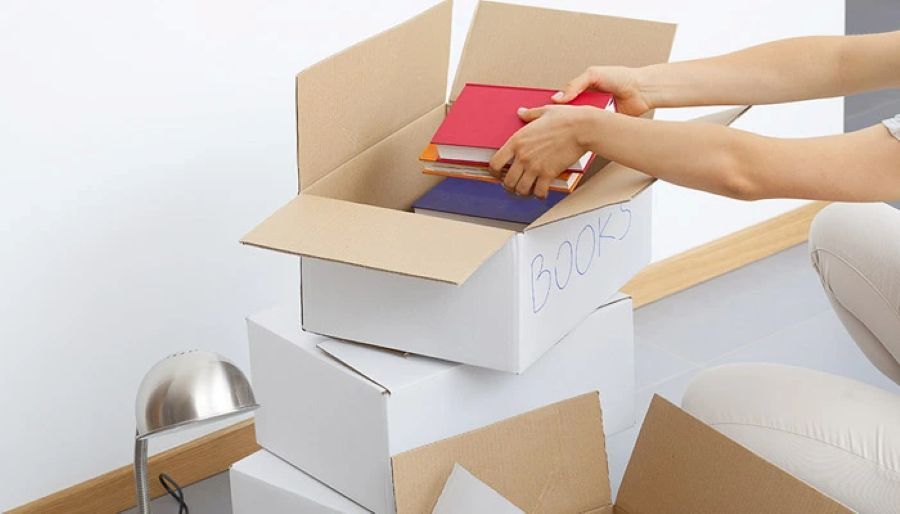Can Moving to a New Place Cause Anxiety?
Yes, moving to a new place can definitely cause anxiety. In fact, moving is one of the top stressors in life, preceded only by divorce and death of a loved one. Research shows that 64% of people say their most recent move was one of the most stressful things they've ever experienced. The good news? Moving anxiety is totally normal, and there are many simple ways to handle it.
This guide will help you understand why moving makes you feel worried, what signs to watch for, and easy steps to feel better during your big move.
Why Does Moving to a New Place Cause Anxiety?
Moving is like shaking up a snow globe - everything familiar gets mixed up all at once. Here's why your brain sees this as scary:
Fear of the Unknown
When you move, you're stepping into uncharted territory. You don't know where the best coffee shop is, which route to work is fastest, or even where to find the light switches! Moving can be anxiety-provoking, no doubt about it. You're leaving everyone you know behind and starting over in a completely different place.
Your brain is wired to feel safe with familiar things. When everything becomes new at once, it's like your internal alarm system goes off.
Loss of Control
The thing about anxiety is we often want to have this element of control, we want to have this element of predictability, and start to finish, the moving process is outside that. Even with the best planning, moving has lots of moving parts (pun intended!). You can't control if the moving truck will be on time or if your new neighbors will be friendly.
Money Worries
Let's be honest - moving costs add up fast. Between hiring movers, deposits, and unexpected expenses, your wallet might feel lighter. Moving can be expensive, whether you're hiring professional movers, renting a truck, or putting a deposit on a new place. Financial stress can make anxiety much worse.
Saying Goodbye
Moving interstate or internationally can mean saying goodbye to friends and family, at least in the short term. Leaving these support networks is tough. Even if you're excited about your new adventure, losing your everyday support system feels hard.
What Are the Signs of Moving Anxiety?
Moving anxiety shows up differently for everyone. Here are the most common ways it might affect you:
Physical Symptoms
Your body often speaks first when anxiety hits:
- Trouble sleeping or tossing and turning at night
- Headaches or muscle tension
- Upset stomach or loss of appetite
- Feeling tired even after rest
- Heart racing or feeling short of breath
- Excess muscle soreness or back pain from overexerting yourself or maybe even develop a cold shortly after the move is over
According to the National Institute of Mental Health, anxiety disorders affect 31.1% of U.S. adults at some time in their lives, and physical symptoms are often the first signs people notice.
Emotional Signs
- Feeling overwhelmed by your to-do list
- Crying more than usual
- Feeling sad about leaving your old home
- Worrying about making friends in your new place
- Doubting your decision to move
Mental Symptoms
- Poor sleep may be a normal stress-related symptom
- Having trouble focusing on work or daily tasks
- Racing thoughts about all the things that could go wrong
- Forgetting important moving tasks
Behavioral Changes
- Putting off packing or moving preparations
- Snapping at family members more than usual
- Avoiding talking about the move
- Less patient with friends and family members as you're packing up the moving truck
Moving Anxiety vs. Relocation Depression
While moving anxiety usually gets better once you settle in, some people experience something deeper called relocation depression.
Moving Anxiety:
- Peaks before and during the move
- Gets better as you adjust to your new home
- Focused on specific worries about the move
Relocation Depression:
- With relocation depression, it amplifies over time, so kind of the opposite of the moving anxiety
- Lasts for months after moving
- Symptoms of relocation depression include social isolation, a sense of apathy toward meeting new people and a loss of interest in hobbies or activities
If your feelings don't improve after a few months in your new home, it's smart to talk to a counselor or doctor.
Who Is Most Likely to Experience Moving Anxiety?
Anyone can feel anxious about moving, but some people have a higher chance:
- People who have moved many times before (moving stress can build up)
- Those who move more frequently are more stressed than those who don't
- Children and teenagers (they have less control over the decision)
- People already dealing with anxiety or depression
- Those moving far from family and friends
- First-time movers who don't know what to expect
Research shows that individuals dealing with high stress levels are predisposed to move house. This creates a cycle where stressed people move more, which makes them more stressed. A University of Auckland study found that those who move more frequently are more stressed than those who don't, and homeowners showed significantly higher stress levels than renters.
How Long Does Moving Anxiety Last?
The timeline for moving anxiety varies from person to person:
Before the Move: Anxiety often starts weeks or months before moving day as you begin planning and packing.
Moving Day: This is usually the peak stress time. You might feel completely overwhelmed.
First Few Weeks: The anxiety of moving does not end when the moving truck pulls away. It may increase after you have settled into your new job or home.
1-3 Months: Most people start feeling more settled as routines develop and they make connections.
Some research suggests that the stress of moving can take a very long time to resolve. Some estimates suggest it can take up to two years to recover from the stress of moving if a person doesn't do anything special to speed up the recovery process.
The good news? Taking active steps to manage your anxiety can speed up this timeline significantly. The World Health Organization notes that there are highly effective treatments for anxiety disorders, and many techniques used for general anxiety work well for moving-related stress too.
Proven Ways to Reduce Moving Anxiety
Before Your Move
Start Early and Stay Organized Do everything you can to start the moving process as early as possible. If it's financially feasible, try to overlap your old and new places by at least a week, so you can move at a more relaxed pace.
Create a moving checklist to break big tasks into smaller, manageable steps. When you check things off your list, your brain gets a little happiness boost!
Research Your New Area Do some research on your new location. Find the areas that look like they could have some enjoyable things for you. Look up:
- The closest grocery store and pharmacy
- Fun restaurants you want to try
- Parks or gyms near your new home
- Local community groups or activities
Focus on What You Can Control I recommend focusing on what you can control. For example, you might not be able to guarantee that you'll have a thriving social life within a month of your move, but you can do what's in your power to make that happen.
You can't control traffic on moving day, but you can:
- Pack a "first day" box with essentials
- Arrange for utilities to be turned on
- Plan your first meal in the new place
During Your Move
Take Care of Your Body Try to incorporate some gentle movement like walking or yoga, get enough sleep, and make sure you're eating regularly. Moving day is like running a marathon - you need fuel and rest.
Stay Connected Connecting regularly with family and friends during your move (even if it's over text) can give you the support you need to transition into this new chapter. Don't try to handle everything alone.
Hire Professional Help Consider using professional movers to reduce your stress. They handle the heavy lifting while you focus on other important tasks.
After Your Move
Make Your New Place Feel Like Home Engage the five senses to signal to your brain that you are indeed home: Play your favorite music as you start unpacking. Bake premade cookie dough to make the house smell cozy and delicious.
Set up your bedroom first so you can rest well. A good night's sleep helps everything feel more manageable.
Build Your New Community Try finding clubs to join. Making new friends as an adult can be difficult, so lean into fun ways to meet people. Join an adult recreational sports league. Find a book club.
Don't wait for people to come to you. Take the first step:
- Introduce yourself to neighbors
- Join local Facebook groups
- Visit community centers or libraries
- Try new hobbies or classes
Special Considerations for Families
Helping Children with Moving Anxiety
Kids often have the hardest time with moves because they have no control over the decision. If your move is stressful for you, it's probably even more stressful for your children.
Tips for Kids:
- Explain clearly why the family needs to move. Show them photos of the new house or let them pick out paint colors for their room
- Let them pack a special box of their favorite things
- Let them host a small farewell party to say goodbye and exchange contact information with peers
- Keep routines as normal as possible
Moving with Teenagers
Teens face unique challenges because friends and social connections are so important at their age. Help them:
- Stay in touch with old friends through video calls
- Research clubs or activities at their new school
- Visit the new area before moving if possible
- Have honest conversations about their feelings
When to Seek Professional Help
While moving anxiety is normal, sometimes you might need extra support. Consider talking to a counselor if:
- Your anxiety is so strong it stops you from doing daily activities
- You feel that your concerns or worries are impeding your regular routine
- You're having panic attacks
- You can't sleep for weeks
- You're using alcohol or drugs to cope
- Your anxiety doesn't improve after 2-3 months in your new home
Therapy can also be an important way to support your mental health if you're anxious about moving. Working with a therapist can help you build insight into the root causes of your anxiety and give you personalized strategies to cope with difficult emotions. The Anxiety and Depression Association of America reports that anxiety disorders are highly treatable, yet only about 37% of those suffering receive treatment.
Tips for Different Types of Moves
Local Moves
Even moving across town can be stressful! You might worry about:
- Finding new routes to familiar places
- Changing school districts
- Different neighborhood dynamics
Helpful approach: Visit your new neighborhood often before moving. Walk around, try local restaurants, and get familiar with the area.
Long-Distance Moves
Moving to a different state or country brings extra challenges:
- Learning new laws or customs
- Finding new doctors and services
- Dealing with time zone changes
Helpful approach: Connect with people online before you move. Join local Facebook groups or forums for your new city.
Work-Related Moves
When your job requires moving, you might feel:
- Pressure to be grateful (even if you're scared)
- Worry about performing well in a new office
- Stress about your family adjusting
Helpful approach: Ask your new employer about relocation resources. Many companies offer help finding housing, schools, or community connections.
Creating Your Moving Anxiety Action Plan
Here's a simple plan you can customize for your situation:
6-8 Weeks Before Moving:
- Create your moving budget and timeline
- Research your new area online
- Start decluttering and organizing
- Book professional movers if using them
4-6 Weeks Before:
- Start packing non-essential items
- Arrange utility transfers
- Update your address with banks, schools, etc.
- Plan goodbye activities with friends
2-4 Weeks Before:
- Confirm all moving arrangements
- Pack most belongings, leaving essentials for last
- Prepare a "first week" survival kit
- Take care of address changes
Moving Week:
- Pack a suitcase like you're going on vacation
- Eat well and stay hydrated
- Ask for help when you need it
- Celebrate small wins throughout the day
First Month After:
- Set up your bedroom and kitchen first
- Explore one new place each week
- Join one activity or group
- Stay in regular contact with old friends
The Silver Lining of Moving Anxiety
Believe it or not, feeling anxious about your move isn't all bad. It shows that:
- You care about making good decisions
- You're thinking ahead and planning
- You value the relationships and places that matter to you
- You're human!
Moving to a new place provides unlimited possibilities, a fresh start towards life. Once you get through the initial adjustment period, many people find that moving becomes one of the best decisions they ever made.
Final Thoughts
Moving anxiety is incredibly common - you're definitely not alone if you're feeling worried about your upcoming move. Yes, it can. Many people become stressed and anxiety when moving, but the feelings don't last forever.
Remember that anxiety often comes from your brain trying to protect you from the unknown. By preparing well, taking care of yourself, and staying connected with others, you can make your move much smoother.
If you're planning a move in the Edmonton area, consider working with experienced local movers who understand that moving is about more than just transporting boxes - it's about helping you start your next chapter with confidence.
Your new adventure is waiting, and with the right tools and mindset, you can handle whatever comes your way. Take it one day (and one box) at a time, and before you know it, your new place will feel like home.



